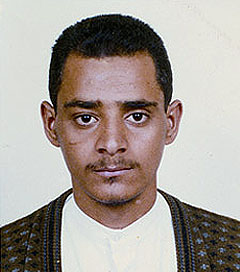 Adnan Farhan Abdul LatifMortaza Hussain writes for Al Jazeera English:
Adnan Farhan Abdul LatifMortaza Hussain writes for Al Jazeera English:
"I am happy to express from this darkness and draw a true picture of the condition in which I exist. I am moving towards a dark cave and a dark life in the shadow of a dark prison. This is a prison that does not know humanity, and does not know anything except the language of power, oppression and humiliation for whoever enters it. It does not differentiate between a criminal and the innocent."
Guantanamo inmate Adnan Farhan Abdul Latif to his lawyer, 26 December 2010
Two weeks ago, the Pentagon quietly released a statement that another Guantanamo detainee had died in custody, the ninth since the prison was opened in 2001. Adnan Farhan Abdul Latif, a 32-year-old man from Yemen who had spent eleven years incarcerated, was found dead in his cell on September 8.
The cause of his death has been recorded as unknown and may never truly be known, but Latif had long suffered from feelings of extreme depression during his time in jail, having made several suicide attempts in the previous years.
Latif had long complained of abuse by prison staff and of his deteriorating physical and mental condition during his imprisonment. Two years earlier, he had written that guards "entered my cell on a regular basis. They throw me and drag me on the floor....They strangle me and press hard behind my ears until I lose consciousness." In 2009 he slit his wrists in an attempt to end his life, writing about the incident later to his lawyer to say that his circumstances in Guantanamo "make death more desirable than living".
Latif was initially captured by Pakistani bounty hunters in the aftermath of the 9/11 attacks when a mixture of confusion and desire for vengeance resulted in the effective labelling of any military age Arab males found in Afghanistan and Pakistan as potential terrorists.
He had been receiving medical care in Amman, Jordan for chronic injuries he had received from a car crash in Yemen that had fractured his skull and caused permanent damage to his hearing. Lured to Pakistan by the promise of cheap healthcare, once the war started he ended up caught in the dragnet of opportunistic bounty hunters who detained him, proclaimed him a terrorist and handed him over to the US military in neighbouring Afghanistan.
Later it would come out that such bounty hunters had been unscrupulous, detaining individuals and labelling them as terrorists baselessly in order to collect large cash incentives from the US military for their handover. No evidence was ever found connecting him to terrorism or violent militancy of any kind, and later medical examinations taken of him upon intake into military custody would corroborate his storyregarding the nature of the head injuries he had come to Pakistan to treat. Indeed, when he was apprehended he was found not to be in possession of weapons or extremist literature of any kind - what he had with him were copies of his medical records.
While during all his years in custody Latif has never been charged with nor convicted of any crime related to terrorism or any other offence, his death now is made even more tragic due to the fact that he had been recommended for release from Guantanamo by the Department of Defense since as early as 2004, and again in 2007, which said at the time that it had determined that he "is not known to have participated in any combatant/terrorist training". In 2009 a special task force commissioned by the Obama administration also ruled that Latif should be released, a decision which its internal mandates specified could only be reached by the unanimous consensus of all US intelligence agencies. However despite being cleared for release he remained in military custody as a decision had been made not to repatriate any prisoners to Yemen due to ongoing political instability in the country, effectively leaving him and others like him in a state of indefinite detention.